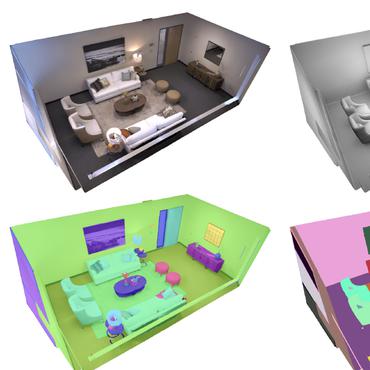Search Results for author: Hyunseo Kim
Found 6 papers, 1 papers with code
ActiveNeuS: Active 3D Reconstruction using Neural Implicit Surface Uncertainty
no code implementations • 4 May 2024 • Hyunseo Kim, Hyeonseo Yang, Taekyung Kim, Yoonsung Kim, Jin-Hwa Kim, Byoung-Tak Zhang
Active learning in 3D scene reconstruction has been widely studied, as selecting informative training views is critical for the reconstruction.
Pearl: A Review-driven Persona-Knowledge Grounded Conversational Recommendation Dataset
no code implementations • 7 Mar 2024 • Minjin Kim, Minju Kim, Hana Kim, Beong-woo Kwak, Soyeon Chun, Hyunseo Kim, SeongKu Kang, Youngjae Yu, Jinyoung Yeo, Dongha Lee
Our experimental results demonstrate that utterances in PEARL include more specific user preferences, show expertise in the target domain, and provide recommendations more relevant to the dialogue context than those in prior datasets.
EXOT: Exit-aware Object Tracker for Safe Robotic Manipulation of Moving Object
1 code implementation • 8 Jun 2023 • Hyunseo Kim, Hye Jung Yoon, Minji Kim, Dong-Sig Han, Byoung-Tak Zhang
We evaluate our method on the first-person video benchmark dataset, TREK-150, and on the custom dataset, RMOT-223, that we collect from the UR5e robot.
Robust Imitation via Mirror Descent Inverse Reinforcement Learning
no code implementations • 20 Oct 2022 • Dong-Sig Han, Hyunseo Kim, Hyundo Lee, Je-Hwan Ryu, Byoung-Tak Zhang
Recently, adversarial imitation learning has shown a scalable reward acquisition method for inverse reinforcement learning (IRL) problems.
Unbiased learning with State-Conditioned Rewards in Adversarial Imitation Learning
no code implementations • 1 Jan 2021 • Dong-Sig Han, Hyunseo Kim, Hyundo Lee, Je-Hwan Ryu, Byoung-Tak Zhang
The formulation draws a strong connection between adversarial learning and energy-based reinforcement learning; thus, the architecture is capable of recovering a reward function that induces a multi-modal policy.
Message Passing Adaptive Resonance Theory for Online Active Semi-supervised Learning
no code implementations • 2 Dec 2020 • Taehyeong Kim, Injune Hwang, Hyundo Lee, Hyunseo Kim, Won-Seok Choi, Joseph J. Lim, Byoung-Tak Zhang
Active learning is widely used to reduce labeling effort and training time by repeatedly querying only the most beneficial samples from unlabeled data.




